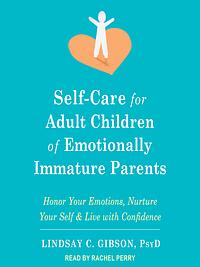You need to sign in or sign up before continuing.
Take a photo of a barcode or cover
informative
reflective
slow-paced
This third book in the Adult Children of Emotionally Immature Parents is too unfocused and generic to be held in the same regard as the first two. There is definitely still some knowledge to be gleaned but I would honestly recommend focusing on intently on Recovering from Emotionally Immature Parents (book 2) and this one could be skipped entirely. If you've never read a self help book before, this one is okay. Otherwise, this feels like going through the motions, which maybe this book was contractually obligated.
Also, the use of "he or she" rather than "they" reappears here after disappearing in the second book. Such a step back...and that could be said about this book in general. The first book is very good, the second book is absolutely great, and this book leaves a lot to be desired.
Also, the use of "he or she" rather than "they" reappears here after disappearing in the second book. Such a step back...and that could be said about this book in general. The first book is very good, the second book is absolutely great, and this book leaves a lot to be desired.
hopeful
informative
inspiring
reflective
fast-paced
informative
reflective
slow-paced
slow-paced
informative
inspiring
lighthearted
reflective
fast-paced
informative
slow-paced
I expected this to be a book about self-care techniques specifically tailored to the traumas of adult children of emotionally immature parents. Ninety percent of the book was generic self-care advice with about ten percent being related to adult children of emotionally immature parents (some of which was described in previous books by the same author).
A small issue I had was the author makes a bold claim in this book that people with attention disorders are more evolved than those without attention disorders. I thought it was inappropriate and unrelated to the topic of that chapter, parenting.
The narrator was ill-suited to the subject matter; I could hear her smiling at points that didn’t warrant a positive attitude (such as describing trauma).
A small issue I had was the author makes a bold claim in this book that people with attention disorders are more evolved than those without attention disorders. I thought it was inappropriate and unrelated to the topic of that chapter, parenting.
The narrator was ill-suited to the subject matter; I could hear her smiling at points that didn’t warrant a positive attitude (such as describing trauma).
Felt all over the place and mostly irrelevant to children of EI parents.
informative
reflective
It has helped me to clear my roads and my mind, so for that, I am thankful.







